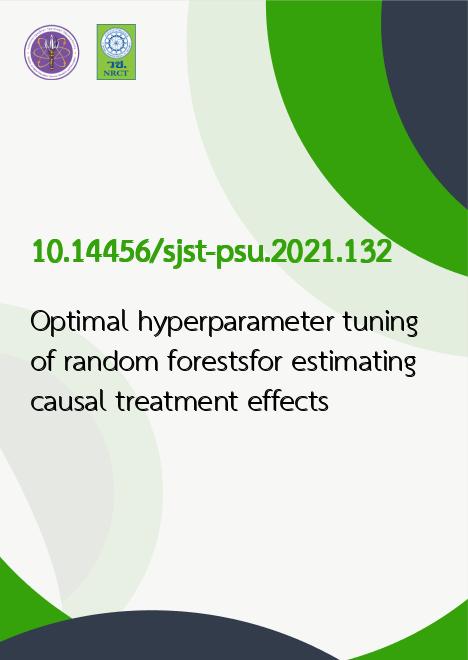
|
Optimal hyperparameter tuning of random forestsfor estimating causal treatment effects |
|---|---|
| รหัสดีโอไอ | |
| Creator | 1. Lateef Amusa 2. Delia North 3. Temesgen Zewotir |
| Title | Optimal hyperparameter tuning of random forestsfor estimating causal treatment effects |
| Publisher | Research and Development Office, Prince of Songkla University |
| Publication Year | 2564 |
| Journal Title | Songklanakarin Journal of Science and Technology (SJST) |
| Journal Vol. | 43 |
| Journal No. | 4 |
| Page no. | 1004-1009 |
| Keyword | random forest, simulation, observational studies, propensity scores, treatment effect, causal inference |
| URL Website | https://rdo.psu.ac.th/sjstweb/index.php |
| ISSN | 0125-3395 |
| Abstract | Recent studies have expanded the focus of machine learning methods like random forests beyond prediction. They havefound utility in the area of causal inference by using it to estimate propensity scores. It has also been established in the literaturethat tuning the hyperparameter values of random forests can improve the estimates of causal treatment effects. We thus addressthe issue of getting the best out of random forest models by proposing to tune the random forest hyperparameters whilemaximizing covariate balance. We consider variants of tuning based on a model fit criterion and compare with tuning to chasecovariate balance. In a simulation study and empirical application in two case studies, we studied the performance of differenttuning implementations, relative to the random forest with default hyperparameters. We find that tuning to chase balance ratherthan model fit when estimating propensity scores induced better balance in the covariates and produced more accurate treatmenteffect estimates. |
